- Home
- Kim Newman
Life's Lottery Page 3
Life's Lottery Read online
Page 3
Dad, who fought the Japs in the war, buys you comics and stories about it: you like Biggles and Sergeant Rock, but prefer Doctor Who and Superman. Laraine, who goes to the Girls’ Grammar and wears a straw boater and a bottle-green blazer with a badge on the top pocket, moans that you only like horrible things, like robots and pirates, but you discount her opinion because she is only interested in clothes and pop music. Her favourite song is ‘White Horses’ by Jacky, which drives you mad if you hear it.
Sometimes, Shane Bush’s gang expands to take in almost all the school. In Class Four, everyone plays a game called ‘Timmy’s germs’. At break-time, someone rubs his hand on Timmy Gossett and then touches someone else, saying ‘now you’ve got Timmy’s germs.’ The victim, choking and coughing, runs around and passes on the deadly touch. Timmy’s germs spread rapidly. Everyone falls wriggling on the grass behind the school. Only Timmy is left standing, blinking stupid tears as he walks through the writhing dead.
One day, Timmy Gossett isn’t in school and Mr Brunt comes to talk to you all, like he talked about Mary. He says that it’s not Timmy’s fault he’s a bit dirty and that he is very upset about the way you treat him. While Mr Brunt speaks, you feel hotly guilty. But the next day Paul sticks his hand in Timmy’s bird’s-nest hair, picking up Timmy’s germs, and comes after you, to pass them on. Paul slaps you harder than he needs to and says, ‘Now, you’ve got Timmy’s germs.’
What do you do?
If you chase Vanda and give her Timmy’s germs, go to 109. If you shrug and tell Paul you don’t want to play, go to 128.
4
‘Who do you like, girl?’ Shane asks again, ‘Napoleon Solo or Illya Kuryakin?’
You think about it. Illya Kuryakin is small, quiet and blond. Not a leader, and often on his own. He’s a bit like you.
Maybe that’s why you say, ‘Illya.’
Shane Bush’s gang gather around you in a half-circle, backing you against a wall.
‘We like Napoleon Solo,’ Shane says.
‘Illya Kuryakin’s a girl,’ says Mary Yatman.
She steps close and pushes you with both hands. You hit the wall, bumping your head. Hot tears start from your eyes.
‘Girl,’ sneers Mary. ‘He’s crying.’
Suddenly, you lose control. You sob, huddled on the ground. Between sobs, you draw in lungfuls of air and let out screams.
The whole world contracts. Children are drawn to you and watch, with interest. A grown-up comes, one of the teachers.
For the rest of the break, you cry and cry and cry. You hate Big School. Hate, hate, hate.
You’ve lost something before you realised you had a chance to have it.
Respect.
You will cry again, soon and often. You will be a girl.
At dinner break, everyone has to have custard with pudding. It’s a school rule, you are told. Rules cannot be compromised. There are no exceptions. All children are treated the same. Custard is mandatory, inescapable, inevitable. No child in the history of Ash Grove County Primary School, stretching back to before the war, has ever got up from the dinner table without having eaten his custard. At home, Mum already knows better than to serve you custard and she’s a far better cook than the Ash Grove dinner ladies. School custard is thick as mud and sickly yellow. Its taste is indescribably vile, like sugared filth, dog’s-muck and spinach, sewage in semolina.
Class One queue up first at the cafeteria and are given dinners on trays. You are guided to a table in the dinner hall and sat with Marion Halsted, Ivor Barber, Michael Dixon and Mary Yatman. The first course is sausages and mashed potatoes, which is acceptable. You eat quickly, always aware of the custard cooling and festering on your jam roly-poly. Then, you get up and walk to the tub where you are supposed to scrape out your leftovers — which you are told are given to farmers as pigswill. You think you have escaped.
Poised over the tub, you are caught. Mrs Fudge, the head dinner lady, catches you at the point of disposing of untouched pudding. She sends you back to your table with orders to eat. You sit down and look at the custard, folding your arms in refusal. Your table-mates, even Mary Yatman, almost admire your rebellion. They all shovel down their custard as if it were ice cream. After a while, Mrs Fudge comes over and tells you, as if you didn’t know, that you haven’t touched your pud. When she insists you have to eat the custard, you cry. When she says your pudding won’t be taken away until you eat it, you cry harder.
Your sister, who knows about you and custard, laughs with her friends. Mrs Fudge, who has a hooked nose and orange hair, changes her approach and tells you how wonderful custard is. Children all over the world would be grateful for even the chance to lick a spoon of it. All around, treacherous kids gulp down the dreadful stuff, pretending to like it. You know school custard is made of worms and goblin’s snot and that it eats away inside at your stomach, destroying your body bit by bit until you turn into custard yourself. The other children have been fooled by Mrs Fudge, who is Evil.
The dinner lady bends low over you and holds a spoon heaped with yellow gloop, waving it in front of your mouth, cooing soothing words like a hypnotist. You calm down, tears drying up. A wicked witchy smile twitches across Mrs Fudge’s lips and she says, ‘There now, that’s better.’ You mop your cheeks with the sleeve of your cardigan. The yellow blob is still there on the spoon in front of your face. You see it move, dripping over the edges of the spoon, spattering on the table-top. Suddenly, Mrs Fudge pinches your nose. You open your mouth instinctively and the spoonful of custard is stabbed against your tongue.
The stuff is inside you. The taste — that horrible, horrible taste — is in your mouth, exploding outwards.
You spit the custard back at Mrs Fudge and produce a yell from your stomach and lungs that flows out and threatens to fill the whole dinner hall, rattling cutlery, cracking glasses, bursting eardrums. Mrs Fudge is driven back, wiping her face. All the other children, from Class One up to Class Six, are struck silent. You pause to draw breath, allowing a second or two of silence, then renew the scream, louder and louder.
Mrs Fudge calls Mr Brunt, the headmaster, and Miss Slowley, the Class One teacher. You still scream, trying to purge the custard from your body. You’re out of your chair — two curves of plywood bolted to a tubular metal frame — and are on the floor, pounding with hands and feet. Everyone thinks you’ll do yourself an injury. Finally, you run down. Your screams become sobs, painful after-burps of the explosion. Miss Slowley helps you up and finds a hankie to wipe your face.
Dinner break is over. Your roly-poly (and custard) is taken away, uneaten, and scraped into the pigswill tub. Everyone, kids and teachers, regards you with a kind of awe. Knowing a screeching beast is caged inside you, they walk carefully as if around an unexploded bomb. You have survived. You’ve got through dinner break without having to eat your custard. This is a victory.
Next day, as you push away your pud, Mrs Fudge only has to say, ‘No more of that nonsense, Keith’ to set you off. Cocooned inside your screaming fit, you know you can keep this up all the way through to Class Six in the unimaginably distant Dan Dare future of 1971. After a week, Mum and Mr Brunt hold negotiations behind the scenes and you are excused custard. Mrs Fudge never talks to you again, her world shattered. An exception has been made to the rules that are her life; she’ll never forgive Mr Brunt for backing down, or forget you for defying her tyranny. You always knew you could sometimes get your way by crying. Now, you know losing control can frighten even grown-ups.
Your mother calls you ‘Nuisance’, Miss Slowley calls you ‘sensitive’, Shane calls you ‘mental’. But whatever they call you, you are excused custard.
After a while, you don’t even have to explode to get your way. Knowing what you are capable of makes grown-ups and children, even wild creatures like Mary Yatman and Timmy Gossett, wary of you. In Class Three, you have to spend an afternoon with a lady called Dr Killian, the school psychiatrist, talking about your fits. She’s the first grown-up to real
ise that sometimes you don’t really lose control, that you pretend. By then, you have proved yourself excellent at reading and drawing and have tried hard with sums. You only go off under extreme provocation. You overhear Mr Brunt telling Mum that Dr Killian thinks you’ll grow out of it. You know the doctor is wrong: you haven’t changed, you’ve just got cleverer about holding it in.
You have friends, mostly other children Shane and Mary pick on: Michael, who has a bad stutter, Timmy Gossett, who is the thickest of the Bottom Table thickos, and Vanda Pritchard, who wears glasses. You are all called girls, even Vanda who really is a girl. You say you think Shane and his gang are stupid, though Shane and Mary, who sit on the Top Table with you, are actually almost as clever as you and Michael.
Mary has rages in which she attacks other children, but may well be the cleverest in your class. She is the only person ever to hurt you so much that you are afraid to explode. In Class Two, she comes up and reaches between your legs, squeezing the sac you have only recently learned to call your balls, inflicting unprecedented pain that leaves you in silent agony.
In Class Three, Shane makes up a game called ‘Mental Fits’. He taps you on the head at break-time and falls down screaming, imitating the way you used to be, usually laughing too much to do a good job of it. Shane’s gang all make a habit of doing this, even Mary. You are almost flattered, though you realise they do it to mock you.
You’re in Class Four when it happens. Your ordeal by custard was a long time ago, though Shane and Mary still throw ‘Mental Fits’ to make fun of you. It’s break-time: you’ve exchanged your Hornet comic for the Fantastic Barry Mitcham’s newsagent dad gets him, Shane and Mary writhe ignored on the grass, Gene Pitney’s ‘The Man Who Shot Liberty Valance’ plays tinnily on a transistor radio. You are called away by someone standing in the copse of trees that is the farthest end of the playground.
‘You,’ the boy shouts. ‘The one they call Mental.’
It’s an older boy, in the uniform and blood-red cap of Dr Marling’s, the Boys’ Grammar. Shane and Mary leave off their ‘Mental Fits’ and pay attention. Barry runs away, towards the toilets. You all recognise Robert Hackwill, who left Ash Grove last year. He used to be official School Bully.
‘Mental,’ Robert shouts. ‘Come here.’
He must think you’re mental if he expects you to go.
‘Come on. I’ve got someone you know here.’
Robert is with his only friend, Reg Jessup, who always stands around snickering when Robert hurts another child. You’re certainly not going into the copse with Robert and Reg. Even Mary shakes her head at the idea.
‘Keith,’ squeaks a small voice, ‘I’m weeing myself. They won’t let me go to the lavvy.’
It is James, your little brother, new to Class One.
‘Your brother’s a shit. He’s no good at all.’
Robert has said one of the Forbidden Words.
‘Come and see your brother,’ Reg says.
You see Robert and Reg, holding James by his shoulders. James’s shorts are dark at the crotch. Wee trickles down his legs. He starts sniffling.
‘Everyone heard two shots ring out,’ Gene Pitney sings, ‘one shot made Liberty fall…’
The bell goes for the end of break. Shane, Mary — even Scary Mary! — and the rest run off, back to the classroom. You don’t move.
‘C’mon, Mental,’ Robert says. ‘We’re not going to hurt you.’
‘Much,’ adds Reg, laughing.
If you go to the classroom and get on with your sums, go to 6. If you go to a teacher and tell what’s happening, go to 10. If you go into the copse to help James, go to 14.
5
‘Dr Cross?’
‘That’s right. You’ll be Susan.’
‘Her I’ll be.’
‘Welcome to our, uh, happy home.’
‘It’s an honour to be here.’
‘Some of our residents don’t think that.’
‘Of course.’
‘This is Marion, by the way.’
‘Can he hear us?’
‘No reason why not. He’s not in a coma.’
‘He’s asleep?’
‘Not quite. Daydreaming, perhaps.’
‘I can see the appeal.’
‘Me too.’
‘Wait a minute. Marion? The Marion? Of Marion syndrome?’
‘I see you’ve read up on us. Yes, this is that Marion. Our most, um, notable resident. Excluding staff, of course. Quite a puzzler, our friend. Aren’t you?’
‘He looks so … well, so …’
‘Yes?’
‘Ordinary.’
‘Quite right. Ordinary.’
Begin again?
6
In 1982, the week after your father’s funeral, you are in town, early in a spring evening, going for a drink in the Lime Kiln with your brother.
Laraine has stayed home with Mum, but you both feel the need to get out of the memory-permeated house. James went into the army at sixteen and you haven’t seen much of him in the last few years. You remember him as the kid who wet himself when you left him to Robert and Reg; now he’s a tattooed squaddie, decorated for valour on the streets of Belfast. You’re afraid to ask what ‘valour’ means. Calmly, without malice, he has said he’d like to be sent to the Falklands. You think he wants a chance to kill an Argie, just to see what it would be like.
The Lime Kiln is full, packed with drinkers whose dads are still alive or have been dead for so long that it doesn’t matter. You think about James. Your younger brother seems to have taken on the job of Man of the Family. His eyes didn’t water at the funeral, like yours did. He’s willing to defend himself, his mates, his family, the country. You know you’d still crawl off to the classroom, shirking your responsibility, losing yourself in the abstractions of arithmetic.
As you force your way through to the bar, a cheer goes up. You wonder why, then remember James is in uniform. There’s a drunken wave of patriotism going on in the aftermath of the invasion of the Falkland Islands, a frenzy of kill-the-Argies war-hunger. The barman is Max Lewis, with whom you were at school though he was never a special friend. James orders a couple of pints of bitter. A man claps him on the shoulder and offers to pay for the drinks.
James, flinching from the touch, turns to accept … and freezes. Pressed close to James by the crowd, you sense the tension which draws your brother tight as a bowstring an instant before you recognise the man with the money.
It’s Robert Hackwill, grown up.
The Ash Grove School Bully has done well for himself. He wears a sheepskin coat and a trilby hat. His property business is flourishing and he is in line for a council seat. He has a flash car, a Jag. His smile splits the world horizontally in half.
Hackwill repeats his offer.
You look around for Jessup, never far from Hackwill, and spot him in a corner. Reg’s smirk is still there, shaped by the fat in his face. He’s still a sidekick.
What will James do? It’s fifteen years later and Hackwill is off his guard. James thinks he could kill a stranger, and this is someone he hates. You know your brother must be thinking of breaking a glass in the grown-up bully’s face.
You remember that day. When James wet himself while being given the worst Chinese burn in history and you ran off. You don’t really know what they did to him then, and have tried not to imagine what it must have been like. For the first time, it occurs to you that it probably didn’t go much beyond a bit of a shove and a few thumps. Robert and Reg were only twelve, James just six. Until now, you’d imagined infernal tortures and unspeakable atrocities. That night, at home safe, James looked accusations at you. He never told your parents how he came by his bruises, and you didn’t speak up either. Telling on Robert Hackwill was an invitation to pain.
You have never talked about it with James. You wonder if it wasn’t what led to you and your brother growing apart, living through your teens in a state of armed neutrality. Because you left him to Hackwill, he’s nev
er trusted you. He has found in himself the strength to look after himself.
Max puts two pints on the bar. James picks his up carefully, getting a good grip.
You can see the pint smashing against Hackwill’s smile, glass exploding, blood and froth drenching him.
But James just takes a deep draught and swallows. Hackwill, smile fixed, eyes hardening, repeats his offer, as if James had not heard him over the din. Somehow, the noise of the pub dies down. You know everyone is paying attention.
James does it.
Like a shot-putter, he hefts the half-full glass, drawing it back level with his shoulder, ramming it at Hackwill’s eyes. The sunburst of blood and beer and scream stills the whole pub.
A circle clears around James and Hackwill.
James kicks Hackwill in the ribs, over and over, grunting ‘Fucker’ with each connection. Bones break.
You are on the sidelines, watching. Nobody tries to break up the fight. No, this isn’t a fight. This is a beating. A punishment beating, they call it in Northern Ireland.
James picks up a stool: not a balsawood prop from a Western, but a solidly made survivor of rowdy nights in the Lime Kiln. The stool doesn’t break, but Hackwill does.
Max is on the phone, talking urgently.
James knows now he is on a deadline. The law will soon be here. He lifts the stool and looks around. His eyes, wild with cold fury, meet yours.
For a moment, you think he’s going to batter you. You want to protect your head with your arms. He knows what you’re thinking and is disgusted with you. Ever since the copse, he’s been disgusted with you.

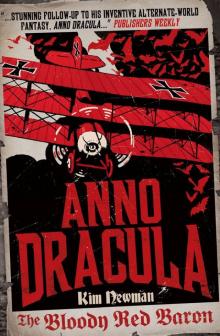 The Bloody Red Baron
The Bloody Red Baron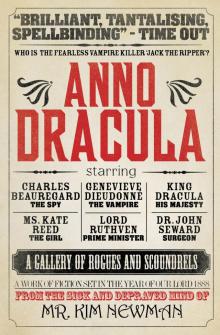 Anno Dracula
Anno Dracula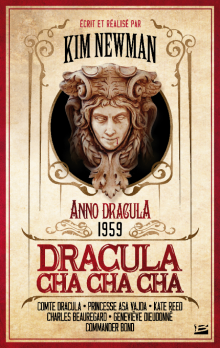 Dracula Cha Cha Cha
Dracula Cha Cha Cha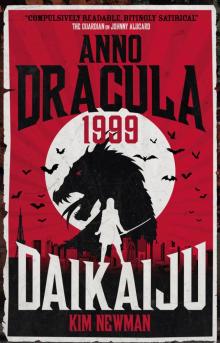 Anno Dracula 1999
Anno Dracula 1999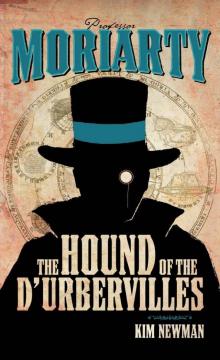 Moriarty: The Hound of the D'Urbervilles
Moriarty: The Hound of the D'Urbervilles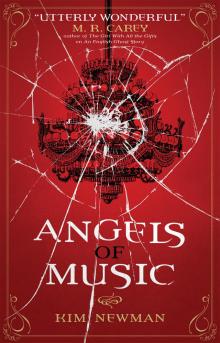 Angels of Music
Angels of Music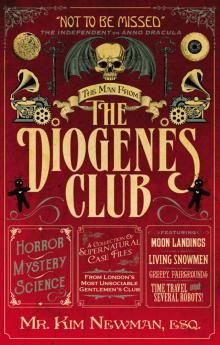 The Man From the Diogenes Club
The Man From the Diogenes Club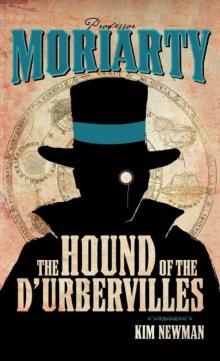 Professor Moriarty: The Hound Of The D’urbervilles
Professor Moriarty: The Hound Of The D’urbervilles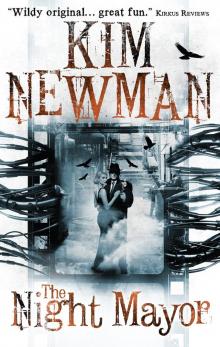 The Night Mayor
The Night Mayor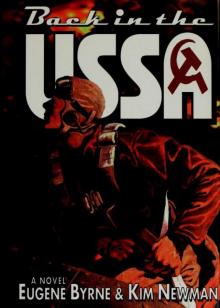 Back in the USSA
Back in the USSA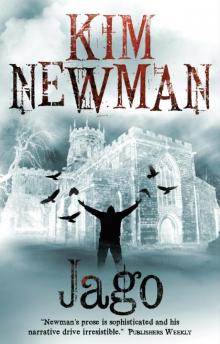 Jago
Jago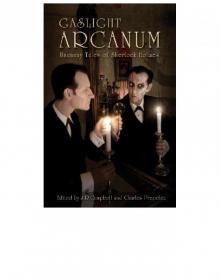 Gaslight Arcanum: Uncanny Tales of Sherlock Holmes
Gaslight Arcanum: Uncanny Tales of Sherlock Holmes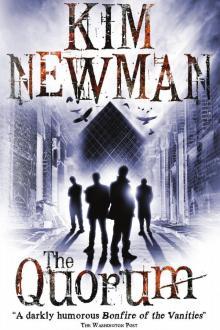 The Quorum
The Quorum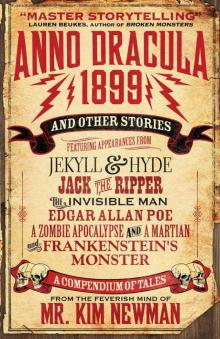 Anno Dracula 1899 and Other Stories
Anno Dracula 1899 and Other Stories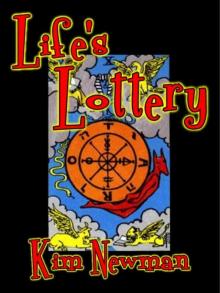 Life's Lottery
Life's Lottery The Secrets of Drearcliff Grange School
The Secrets of Drearcliff Grange School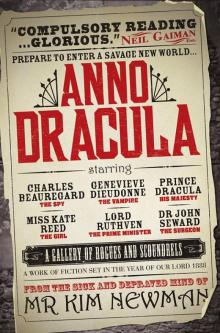 Anno Dracula ad-1
Anno Dracula ad-1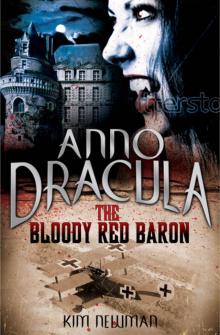 The Bloody Red Baron: 1918 ad-2
The Bloody Red Baron: 1918 ad-2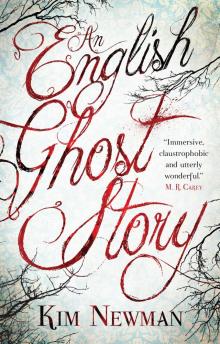 An English Ghost Story
An English Ghost Story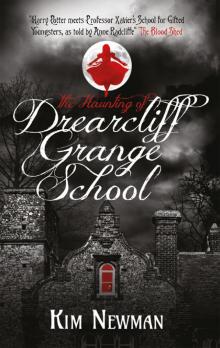 The Haunting of Drearcliff Grange School
The Haunting of Drearcliff Grange School The Other Side of Midnight
The Other Side of Midnight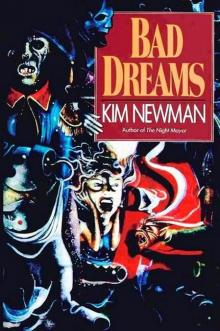 Bad Dreams
Bad Dreams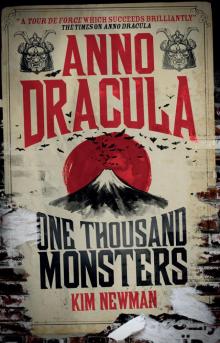 Anno Dracula--One Thousand Monsters
Anno Dracula--One Thousand Monsters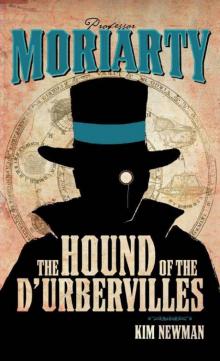 The Hound Of The D’urbervilles
The Hound Of The D’urbervilles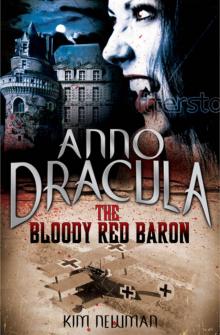 The Bloody Red Baron: Anno Dracula 1918
The Bloody Red Baron: Anno Dracula 1918